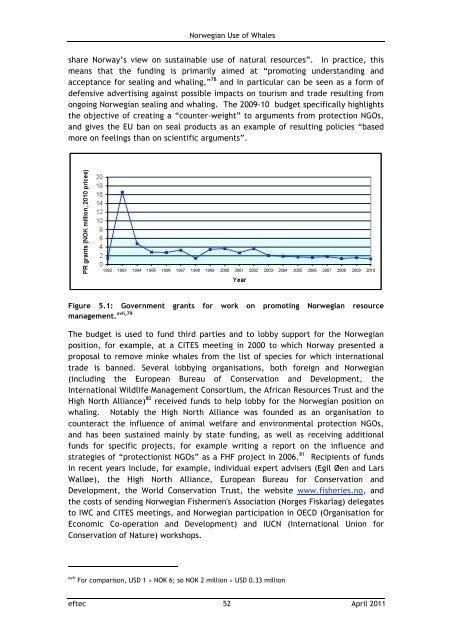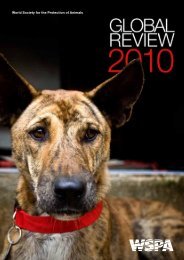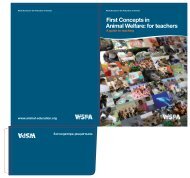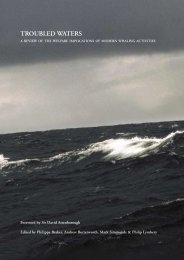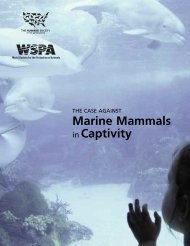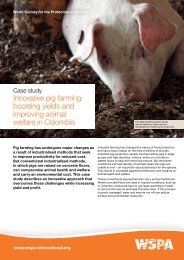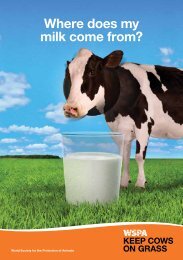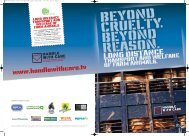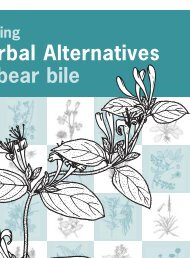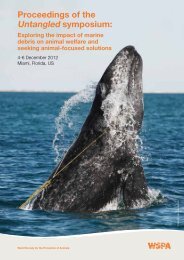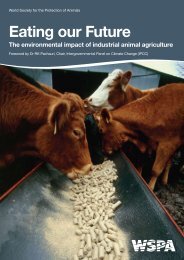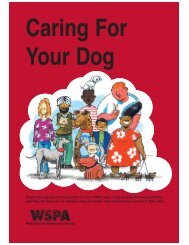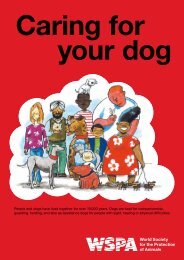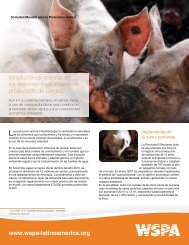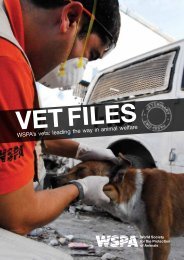norwegian use of whales: past, present and future trends - WSPA
norwegian use of whales: past, present and future trends - WSPA
norwegian use of whales: past, present and future trends - WSPA
Create successful ePaper yourself
Turn your PDF publications into a flip-book with our unique Google optimized e-Paper software.
Norwegian Use <strong>of</strong> Whales<br />
share Norway’s view on sustainable <strong>use</strong> <strong>of</strong> natural resources”. In practice, this<br />
means that the funding is primarily aimed at “promoting underst<strong>and</strong>ing <strong>and</strong><br />
acceptance for sealing <strong>and</strong> whaling,” 78 <strong>and</strong> in particular can be seen as a form <strong>of</strong><br />
defensive advertising against possible impacts on tourism <strong>and</strong> trade resulting from<br />
ongoing Norwegian sealing <strong>and</strong> whaling. The 2009-10 budget specifically highlights<br />
the objective <strong>of</strong> creating a “counter-weight” to arguments from protection NGOs,<br />
<strong>and</strong> gives the EU ban on seal products as an example <strong>of</strong> resulting policies “based<br />
more on feelings than on scientific arguments”.<br />
Figure 5.1: Government grants for work on promoting Norwegian resource<br />
management. xvii,79<br />
The budget is <strong>use</strong>d to fund third parties <strong>and</strong> to lobby support for the Norwegian<br />
position, for example, at a CITES meeting in 2000 to which Norway <strong>present</strong>ed a<br />
proposal to remove minke <strong>whales</strong> from the list <strong>of</strong> species for which international<br />
trade is banned. Several lobbying organisations, both foreign <strong>and</strong> Norwegian<br />
(including the European Bureau <strong>of</strong> Conservation <strong>and</strong> Development, the<br />
International Wildlife Management Consortium, the African Resources Trust <strong>and</strong> the<br />
High North Alliance) 80 received funds to help lobby for the Norwegian position on<br />
whaling. Notably the High North Alliance was founded as an organisation to<br />
counteract the influence <strong>of</strong> animal welfare <strong>and</strong> environmental protection NGOs,<br />
<strong>and</strong> has been sustained mainly by state funding, as well as receiving additional<br />
funds for specific projects, for example writing a report on the influence <strong>and</strong><br />
strategies <strong>of</strong> “protectionist NGOs” as a FHF project in 2006. 81 Recipients <strong>of</strong> funds<br />
in recent years include, for example, individual expert advisers (Egil Øen <strong>and</strong> Lars<br />
Walløe), the High North Alliance, European Bureau for Conservation <strong>and</strong><br />
Development, the World Conservation Trust, the website www.fisheries.no, <strong>and</strong><br />
the costs <strong>of</strong> sending Norwegian Fishermen's Association (Norges Fiskarlag) delegates<br />
to IWC <strong>and</strong> CITES meetings, <strong>and</strong> Norwegian participation in OECD (Organisation for<br />
Economic Co-operation <strong>and</strong> Development) <strong>and</strong> IUCN (International Union for<br />
Conservation <strong>of</strong> Nature) workshops.<br />
xvii For comparison, USD 1 ≈ NOK 6; so NOK 2 million ≈ USD 0.33 million<br />
eftec 52 April 2011


